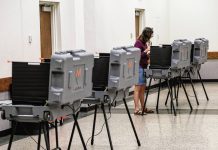BROWN COUNTY — Brown County Clerk Kathy Smith has been charged with Level 6 felony official misconduct following an investigation by the Indiana State Police.
ISP Det. David Makowsky’s report alleges that Smith used a county government credit card to make personal purchases, then failed to provide receipts to Brown County Auditor Julie Reeves, according to a probable cause affidavit filed Tuesday.
Smith was issued the card to pay for smaller items needed in her office. When the county credit cards are used, an “Accounts Payable Voucher” detailing what was purchased and where is due at the end of the month, and a receipt should accompany each purchase listed on the voucher. ISP was asked to investigate the possibility Smith had used her county-issued credit card for personal purchases. She had reportedly described items purchased on the voucher as items that were different than what was purchased, Makowsky reported in the affidavit.
The investigation began in 2020 after Smith had allegedly failed to provide receipts for purchases on the credit card that were made in May and June that year. After the receipts were turned in, there were “questionable purchases made that did not appear that they would be for use in the clerk’s office,” the affidavit states. Makowsky then asked Reeves to review all vouchers Smith had submitted from the time she took office in January 2019 due to “irregularities.”
In July 2019, Smith submitted a voucher to the auditor for $21.42 at Walmart spent May 19, 2019. She said it was for binder protective sleeves. The receipt showed she had spent $15.78 on candy, $2.27 on ink pens and $1.27 on sticky notes for a total of $21.42 including tax.
Later that year, a deputy auditor was trying to pay the credit card bill and asked Smith for two receipts. Smith said she had the receipts in her car that was being repaired, but she did not try to get the receipts from the repair shop, and the auditor’s office never received them. One purchase was at Walmart for $47.10 and another was $21.94 at Staples. Smith told the auditor’s office that the Walmart purchase was for clear containers to store paper in, paper to print marriage licenses and cleaning supplies.
“This pattern of accumulating small purchases and not providing receipts, or submitting inaccurate vouchers concerned the Brown County Auditor’s Office,” Makowsky wrote in his report.
The main voucher in question was from May 17, 2020. Smith described the purchase as being for election items including supplies to make signage and mark voting machines, according to the voucher Smith submitted. On May 17, 2020 Smith spent $22.06 at a Family Dollar store on a bottle of cleaning solution; laxatives and suppositories; Magnesium Citrate; Donald Duck orange juice and Turtles candy.
According to the affidavit, Smith had made three other purchases in May and did not provide receipts for two of the three. She spent $161.86 at a Sam’s Club on May 31, 2020, and provided a receipt of mainly food and drink items. A bath mat was also purchased there. Smith did not provide receipts for $7.68 spent at Staples on May 19, 2020 and $17.66 spent at Family Dollar on May 28, 2020, the report said.
Vouchers were submitted for purchases in October 2019. Two receipts for $85.51 and $131.25 spent at Party City were submitted, with most of the items being balloons and tablecloths. During an interview with police in October 2020, Smith said she bought the balloons and tablecloths for the public test of voting machines at the Brown County Public Library that day to “make it more festive.”
After police showed her a receipt at Walmart for candy, sticky notes and pens, but not the binder sleeves she had described in her voucher, Smith told police that she had labeled the invoice wrong. She noted that Reeves had signed off on that voucher.
When asked about the May 2020 receipts from Staples and Family Dollar which the auditor never received, Smith said the purchases were for the election—which was on June 2 that year instead of in early May like normal. Smith told Makowsky she could not find the receipts.
When asked why Smith went to the auditor’s office on July 28, 2020 to pay cash for the purchases at Staples and Family Dollar, Smith said she was “tired of the auditor getting on her for not turning in the receipts.”
Smith explained that the food purchased from Sam’s Club was for workers on Election Day who did not receive a per diem of $25, such as election board members and the clerk’s office staff. She said the bath mat was to cover a piece of metal sticking out at the gymnasium where voting was happening.
Smith said the items purchased at Family Dollar, including the orange juice and laxatives, were bought the same day she had purchased markers for election signs and marking voting machines. She said it was a “screw up” and that she did not purposefully mean to use the county-issued credit card, according to the affidavit.
Reeves later told Makowsky that Smith had come into her office two days after her interview with police to pay for those Family Dollar purchases. It is unclear if Smith used her own money when paying for the purchases.
In addition to the felony charge, Smith was charged with deception and theft, both Class A misdemeanors.
When reached by phone this afternoon, Smith said she would call back, but no call had been returned as of Republic deadline.
Smith is up for re-election this year and faces a challenger in the Republican primary. According to Indiana Code, a person cannot hold office if they are convicted of a felony, but being charged with a felony is different.
A special prosecuting attorney was appointed to this case following the completion of the ISP investigation with Bartholomew County Deputy Prosecutor Josh Scherschel being assigned to this case. A special judge was also appointed by the Indiana Supreme Court.
All authority involving charging decisions were turned over to Scherschel, Brown County Prosecutor Ted Adams said.
This was done to “ensure there would be no appearance of impropriety,” Adams said.
“This authority included the authority to determine whether or not to criminally charge Ms. Smith and, if charges were filed, the discretion to determine what charges to file,” he said.
“It is always appropriate to note, as in all criminal cases, that the charges against Ms. Smith are merely allegations, and remain so, unless or until the allegations have been proven beyond a reasonable doubt.”





